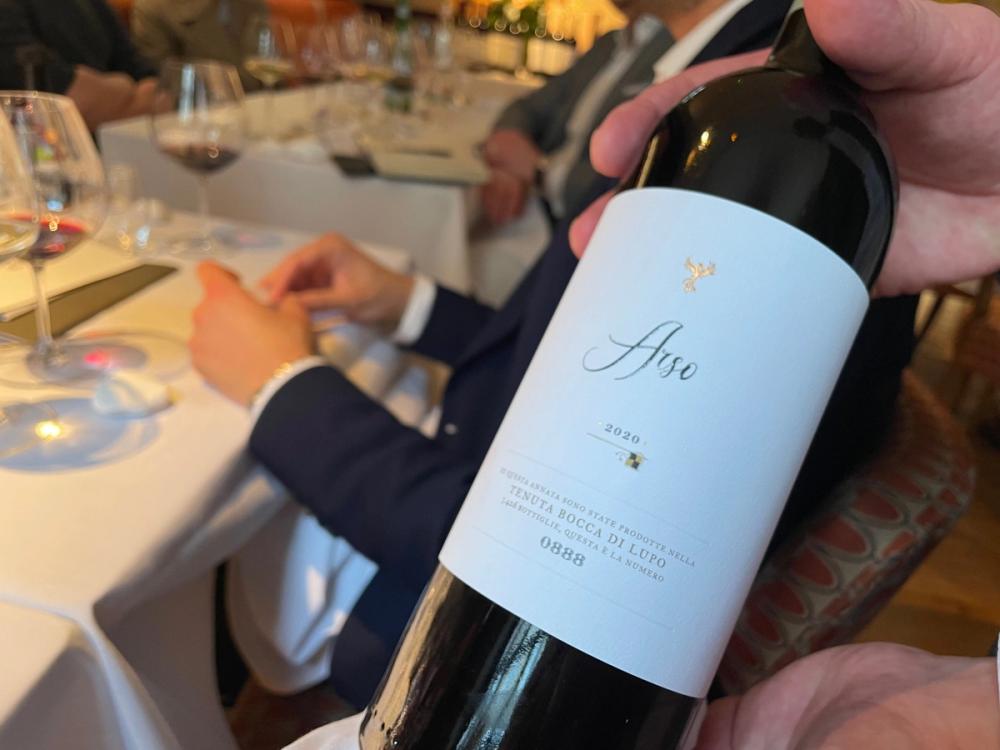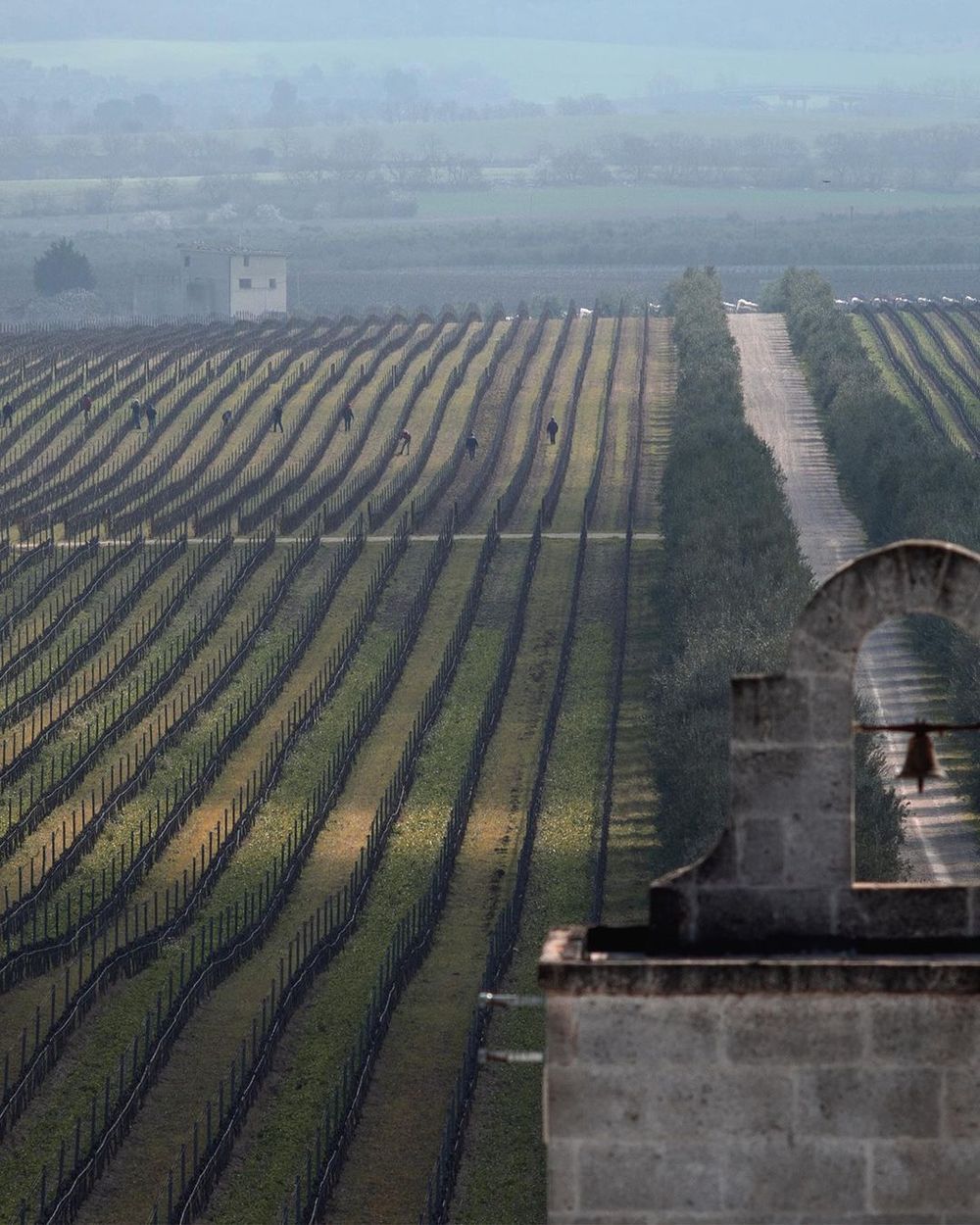Back in the 1960s when frustrated Tuscan winemakers began experimenting with non-Italian grape varieties and techniques borrowed from Bordeaux and beyond little did they know that a revolution was afoot.
Today, the ‘Super-Tuscan’ wines being pioneered in the ‘60s are everywhere and these wines once shunned by the authorities now have their very own appelattions and regular 100-point ratings. In fact, Italy’s most famous - not to mention expensive - wines all fall under the Super-Tuscan umbrella; Tignanello, Ornellaia, Sassicaia, Redigaffi… the list goes on.
So what about extending the ‘super’ category beyond Tuscany? Well if you travel south to the very bottom of mainland Italy, the Tenuta Bocca di Lupo estate in Puglia has done just that. Bocca di Lupo in The Murgia to the north of the region is part of the Antinori family (of Tignanello fame) so it’s fitting that it’s from here that a brand new ‘Super-Puglian’ wine has been created.

Arso - more on the name later! - is a single site, certified organic 100% Cabernet Franc. The grapes are all estate grown and come from a 10-hectare plot which lies in the middle of the rugged Bocca di Lupo estate. The vineyard sits at 300 metres above sea level on calcareous-tuff soils, and experiences exceptional diurnal temperature swings. Arso falls under the Puglia IGT appellation and the inaugural vintage is the 2020, released in summer 2024.
“The idea behind crafting Arso, a monovarietal Cabernet Franc, on an estate so far in the southern part of Italy, came from our vision to impress and surprise, while challenging misconceptions and preconceived limitations. Cabernet Franc flourishes in this exceptional terroir where long seasons, optimal temperature swings and calcareous-tuff-based soils impart a perfect balance between the power and sophistication of this fascinating grape variety,” writes Antinori’s CEO and chief winemaker Renzo Cotarella in his notes about the wine.

"Now I see the problem of the name in the UK, but it’s our name, I don’t care," Vito Palumbo, CEO of Bocca di Lupo and Tormaresca Estates
Cotarella isn’t in London to launch the new wine, instead we are joined by Vito Palumbo, CEO of Bocca di Lupo and Tormaresca Estates (both in Puglia) at Antinori’s new London restaurant to get the lowdown on Arso and why Puglian wine in general is on the up.
“As a region Puglia is not famous for fine wines,” he says. “In 1998 this was a no-man’s land, it’s been a poor region with lots of farming and commerce, but it’s never been cool or had a ‘brand’.”
Around a decade ago the tourism renaissance began, but Antinori has had a presence in the region since 1998, and with its two estates - Bocca di Lupo in the north and Tormaresca in the south - it has been growing and promoting local varieties such as Primitivo, Negroamaro, Aglianico and Fiano for more than a quarter of a century.
According to Palumbo it’s not widely known that for many years international varieties have been part of the Puglian landscape, but these have often been used in blends or not shouted about.
“It’s an area where international grapes have always been present after the phylloxera replanting but it wasn’t the core business here,” he says. “When we planted Cabernet Franc we were thinking about blends, and then decided to go down the single variety route.”
The reasons for this, he explains, lies in the quality of the grapes produced from this parcel of Cabernet Franc, the desire to impress and surprise and the fact that single variety wines work much better when selling by-the-glass.
“When the wine was announced people made fun of what we were doing,” says Palumbo, “but that’s okay. This is exactly what we want, to provoke a little bit, to create a little bit of interest and to open the minds of people.”

Quality terroir: Bocca di Lupo estate, Puglia
They began planting the Cabernet Franc at Bocca di Lupo in 2010 and ahead of the 2020 release - the official first vintage - the estate has produced a Cab Franc from these vines every year but were not completely satisfied with the wine until now. “Perfection is a stupid thing to worry about in life, but we certainly wanted something unique, so after 10 years we felt that it was ready,” says Palumbo.
After tasting the wine which is plush and bright with lip-smacking fruit, generous mouthfeel and a herby tang (full tasting note below), it’s suggested that the name ‘Arso’ perhaps doesn’t roll off the tongue in the English language, particularity with certain regional accents (Northern Irish, Scouse) where is takes on a different meaning.
“My wife did mention this, she’s American,” says Palumbo. “Now I see the problem of the name in the UK, but it’s our name, I don’t care.”
The name comes from the Italian word for ‘burned/consumed by fire’, and refers to the practice in Puglia to exploit the wheat fields for an extra crop by burning the wheat stubble after harvest and using the ashes to create ‘grano arso’ (burned wheat) black flour.
“The word ‘arso’ talks about this area of Puglia which was abandoned by the government; no tourism, no industry,” adds Palumbo.
Tasting the wine Palumbo describes it as being ‘like a ballerina’. It has the muscles but only the ones needed to be delicate and strong. Cotarella is a little bolder in his aspirations for the wine.
“I wanted to make a wine that could compete with every other single varietal Cabernet Franc in the world. A wine that could rival the finest, that could compete at the same level. It may not win the Champions League but will definitely make it to the finals without losing zero to five.”
Back of the net.
Arso 2020
Dark red in colour, deep rather than heavy, but bright and glistening in the glass. Some vanilla pod on the nose immediately backed up by black and blue fruit. It’s smooth, succulent even with no rough edges. It’s fluid, but not crunchy, if anything it lacks that bite of some Cabernet Franc wines. There’s an abundance of fruit though; black cherry, blackberry, and a delicious lifted note of oregano on the finish. Polished and more-ish, super with food.
Arso di Bocca di Lupo 2020 is priced £215 (retail), and at present only sold through a select number of prestige fine dining listings. It is imported and sold by Berkmann.






























